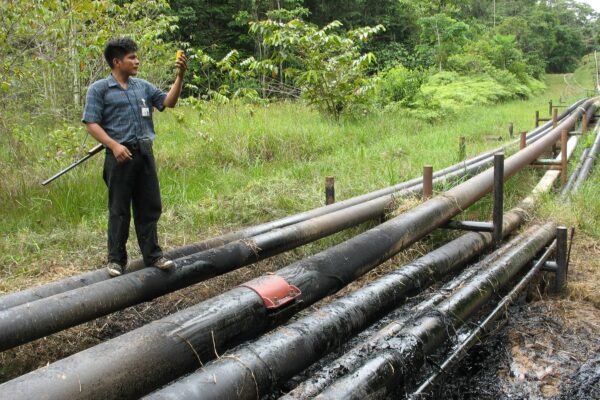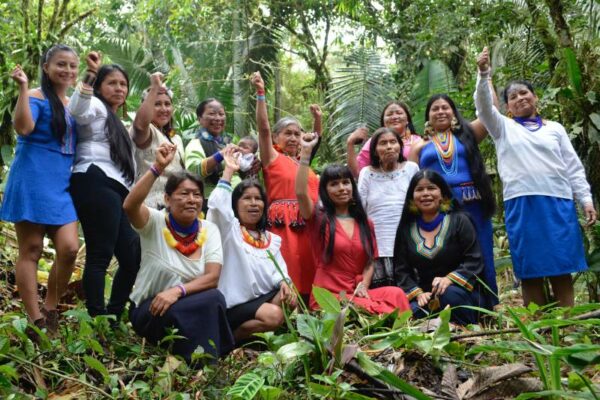Bogota – European environmentalists began their international caravan in Colombia to protest against big petroleum projects here, and are to arrive in neighboring Ecuador Thursday, where they will speak out against the construction of an oil pipeline through that country’s Amazon forests.
The presence of a dozen activists in the two Andean countries coincided with the confirmation Friday of the U.S.-based OXY company’s decision to abandon its oil exploration efforts in the territories of the U’wa indigenous community in Colombia.
The pro-environment delegation, headed by Giuseppe De Marzo, Latin America director for Italy’s Green Federation and for the non-governmental ENI Observatory, is slated to arrive Thursday in Ecuador, after four days of events along its route through Colombia.
The mandate of the Observatory, made up of leading Italian environmental groups and the Italian Green Party, is to monitor the activities of the Ente Nazionale Idrocarburi, which is participating in the construction of the pipeline, known as Oleoducto Crudos Pesados (OCP), in Ecuador, through its Agip Oil subsidiary.
The activists’ campaign is centered on the construction of the OCP, which would transport crude from the Ecuadorian Amazon to the Pacific coast, and on the exploration and extraction of fossil fuels in the U’wa territories in Colombia.
This effort against the two major petroleum projects in the Andean region has the backing of the World Social Forum, the second annual meeting of which took place earlier this year in the southern Brazilian ( news – web sites) city of Porto Alegre.
De Marzo, who also is a member if the International Committee of Solidarity with the U’wa People, said this indigenous community’s battle against OXY (Occidental Petroleum Company) exploitation of the area is “a great metaphor for our times.”
Indigenous resistance “is the paradigm of a small group confronting a giant, and of the struggle of minorities against the homogenizing world view,” De Marzo told IPS.
The U’was number 5,000 people, distributed among 17 communities in the northeastern Colombian departments of Arauca, Norte de Santander and Boyacá, all bordering Venezuela.
De Marzo said he is pleased with the oil company’s decision to halt its activities in the area known as the Samoré Block, in the Colombia-Venezuela border region, which is in the expanded protected jurisdiction of the U’was. “Their struggle is our symbol,” he said.
Roberto Pérez, president of the high council of the U’wa community, is less enthusiastic about the OXY decision.
“OXY may have left, but we have reports that the state-run Colombian Petroleum Enterprise (Ecopetrol) will contract out other exploration studies – after August – with a foreign company, probably Spain’s Repsol,” Pérez told IPS.
The initial data about possible petroleum reserves of some 1.3 billion barrels in U’wa territory was released in the mid-1990s, paving the way for oil companies that wanted to launch exploration activities.
Colombian courts last year revoked approval of a petition for legal protection granted the Indians to prevent OXY from petroleum prospecting in their territory. The legal argument was that such actions did not violate any fundamental rights of the U’wa community nor its cultural integrity.
However, at the end of 2001, the U.S. oil company concluded in its studies that the likely reserves existing there did not merit continuing exploitation of the Samoré Block. The decision to withdraw from the area that was confirmed Jun 7.
Pérez has led his people in opposing oil exploitation in their territories, and the U’was even threatened collective suicide, stating that petroleum is “the blood of our mother”, the earth.
“We cannot negotiate her life,” he said. “Colombian society may see petroleum as development, but we believe it means environmental and cultural destruction.”
The U’wa leader added that the government had not kept its promise to designate funds for buying land from the peasant farmers that lies within the 220,000 hectares of protected area legally conceded to the U’was in August 1999.
“The Environment Ministry offered to set aside funds, but has not yet done so,” said Pérez.
The environmentalists of the international solidarity caravan joined with the U’was in stressing the spiritual side of their message, “which places humans in harmony with nature in the center of everything” and seeks peaceful solutions to conflicts.
“Petroleum fuels the battle for power. In the wake of the mega-projects comes militarization and violence,” commented De Marzo, outlining the scenario he says will follow the pipeline construction in the Ecuadorian Amazon, the other target of the caravan’s protest.
Some 40 indigenous groups, as well as peasant farmers and fishing communities would suffer as a result of the OCP in Ecuador, says De Marzo. The 500-km pipeline is to transport an average of 450,000 barrels of petroleum daily.
The Italian environmentalist says at that level of production, the Ecuadorian oil reserves “would barely last eight years.” The project is so harmful, he added, “that the World Bank ( news – web sites) refused to approve it because it lacks environmental impact studies.”
The OCP is in the hands of an international consortium that includes Agip, of Italy, OXY and Kerr McGee, of the United States, Repsol, of Spain, and Alberta Inc., of Canada, said De Marzo.
The coordinator of the international caravan, which will participate in protest actions in Quito with local organizations like the Confederation of Indigenous Nationalities of Ecuador, stressed that they are not protesting because they do not want any oil exploitation at all – “we are not going to fall into that trap” – but rather “because these oil mega-projects are illegal.”
De Marzo said the OCP consortium promised the pipeline would create 450,000 jobs, but there would really be only 4,000, and they would not be permanent. Furthermore, “those who work on the project will be foreigners, because it involves highly specialized tasks.”
The political action of the caravan and of the organizations involved – such as Builders of Peace, Liliput Network, Terranova, and others focused on peace and human rights – is based on “the search for an alternative to the neo-liberal economic model,” he said.
As such, the interlocutors in the tour through Colombia and Ecuador are indigenous peoples, unionists, environmentalists and women’s organizations. “The struggle is the same,” said De Marzo, because they are all involved in the process of building a network that coincides with the movement against neo-liberal globalization.













